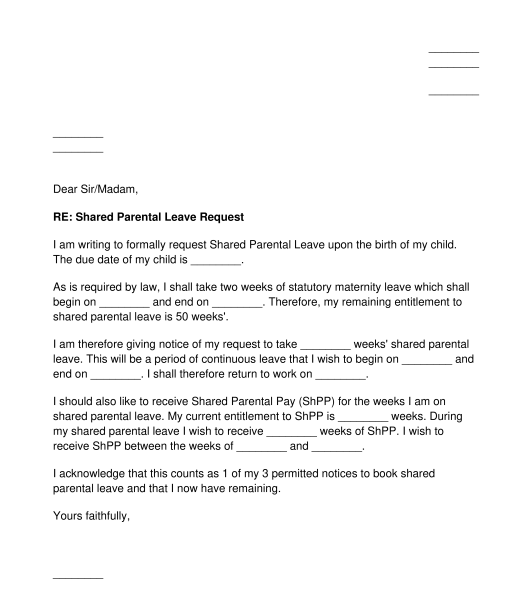 11/11/2025
11/11/2025

Answer a few questions and your document is created automatically.

Your document is ready! You will receive it in Word and PDF formats. You will be able to modify it.

 11/11/2025
11/11/2025
 Word and PDF
Word and PDF
 1 page
1 page
This document can be used by an employee who wishes to request Shared Parental Leave (SPL) from their employer, where they are eligible to do so. It fulfils the employee's duty to notify the employer of any intended SPL and requests that the employer responds with further information regarding pay and if the employee's leave requests have been accepted.
This letter can be used by parents who are giving birth to or adopting a child. It can be used by the mother, primary adopter, partner of the mother or primary adopter, or the father/co-parent of the child. The letter sets out the relevant date or dates upon which the parent wishes their SPL to begin and end and if they wish to receive any Shared Parental Pay (ShPP). The letter can be used to book periods of continuous or discontinuous leave. The maximum amount of time that can be taken as SPL is 50 weeks.
ShPP is dependent on the length of maternity leave the mother has taken and how much time is left.
Paternity Leave refers to a period of absence from work given to the father to help with supporting and caring for a new born child and the mother of the child.
Shared Parental Leave is a period of absence that is granted to mothers or fathers to allow them to end maternity leave early to enable one or both parents of the child take leave in a more flexible way during the baby's first year. The parents of the child can either take leave at the same time or separately.
It is recommended that the employee who is applying for SPL check any employment contract or employee handbook or workplace policy they may have received from their employer in relation to any rights granted to them regarding SPL and ShPP.
This document should be completed and signed by the employee who is request SPL. It should then be delivered to the employer that they are requesting SPL from. This can be done in person or by post or email. This request should be submitted to the employer a minimum of 8 weeks' before the date on which they wish for their leave to start.
The employer should respond to the employee's request for SPL within 14 days' of the date of the letter. If the employer does not respond within 14 days, the employee shall be entitled to either withdraw this request and take maternity leave or paternity leave or they may take one continuous block of shared parental leave starting on the first date notice has been given for. It may be prudent for the employee to keep a copy of this document for their own records.
The Shared Parental Leave Regulations 2014
The Shared Parental Pay (General) Regulations 2014
The Maternity and Adoption Leave (Curtailment of Statutory Rights to Leave) Regulations 2014
ACAS guidance on Shared Parental Leave
UK Government guidance on Shared Parental Leave and Pay
You fill out a form. The document is created before your eyes as you respond to the questions.
At the end, you receive it in Word and PDF formats. You can modify it and reuse it.
A guide to help you: How to Send a Letter
Letter Requesting Parental Leave - Sample, template
Country: United Kingdom